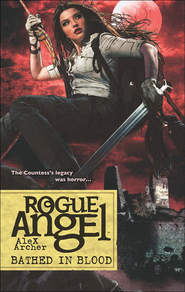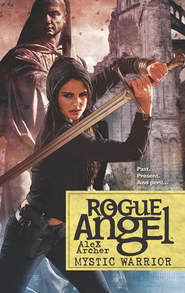По всем вопросам обращайтесь на: info@litportal.ru
(©) 2003-2025.
✖
Secret Of The Slaves
Автор
Год написания книги
2019
Настройки чтения
Размер шрифта
Высота строк
Поля
“Makes sense,” Dan said.
The tall woman had led them back to the cash register, which was a modern digital model, Annja noted, Beside it stood racks of CDs with colorful covers. Dan picked one up and scrutinized it. “You have a sideline selling Brazilian jazz?” he asked. “These don’t look like New Age meditation CDs.”
“They are for the capoeira, ” Mafalda said.
“The martial art?” Annja asked.
Mafalda laughed. “It’s more than a martial art.”
“What do you mean?”
“Do you know the story of the slaves?” Mafalda asked. Annja felt Dan tense beside her. Her own quick inhalation turned into a sneeze, only half-staged.
“Some,” Annja said cautiously.
“Well, the slaves weren’t happy being slaves. So they practiced to rebel. But the masters would not permit this. So the slaves had to create a way of training that they could practice under the masters’ eye without their suspecting.”
“Hiding in plain sight,” Annja said.
Mafalda nodded, smiling. “Exactly. So they hid their warrior training as a type of dance used in religious rituals.”
“And so in turn capoeira practice got worked into the actual rituals?” Annja asked.
“Perhaps. Today capoeira is all these things—a form of fighting, a dance, candomblé ritual.”
“I see.” Annja skimmed the rack until a cover caught her eye. A very dark, very skinny man was performing a trademark capoeira headstand kick in front of a rank of colorfully dressed dancers shaking what appeared to be feather gourd rattles. “I’ll take this one, please.” It seemed a gracious thing to do, a way to keep open lines of communication with their uninformative informant. Also she was curious.
Mafalda rang up the transaction. She wrapped the CD in fuchsia paper and taped it neatly.
“Some of the slaves did fight back, you know,” she said as she handed the parcel to Annja. “They escaped and fled into the forest. There they fought. Some died, some won their freedom.”
“The Maroons,” Dan said.
“Yes,” Mafalda said. Her manner was suddenly very grave. “The ones about whom you asked—they do not like strangers seeking after them. Capoeira was not the only weapon they created unseen beneath the world’s nose. And their reach is very long.”
6
“Was it just me,” Dan said, sipping strong coffee the next morning at a green metal table at an open-air waterfront café near their hotel, “or did that woman seem scared to tell us about the Maroons?”
“It wasn’t just you,” Annja said. She took a sip of her own coffee. “But she seemed more scared not to.”
“So did we learn anything?” he asked.
“They have a long reach.”
Dan set down his cup, shaking his head. “This is all starting to sound way too Indiana Jones.”
She smiled. “What would you call a quest for a lost city?”
He laughed but shook his head again. “The real world doesn’t work like that.”
“Doesn’t it? I thought terrorizing people to get results was thoroughly modern. Doing it long-distance, even.”
“Touché,” Dan said without mirth. “It just struck me as far-fetched.”
It would have me, not so long ago, Annja thought but did not say.
The café stood near a set of docks servicing riverboats somewhat larger, if not markedly more reputable looking, than the small craft Annja and Dan had seen crowding the river the day before. Dockworkers were swaying cargo off a barge with an old and rickety-looking crane. The stevedores were big men, mostly exceedingly dark and well muscled.
Although it was relatively early in the day and they were both lightly dressed and sat in the shade of an awning, Annja could feel sweat trickling down her back.
“It’s not, really,” she said, sipping her coffee. “Farfetched, I mean. If you think about them just like any other…interest group or faction. A lot of governments go to extremes to protect their secrets.”
“Corporations, too.”
“Sure. Other groups, as well. These people’s ancestors fled to escape slavery and then persecution—attempts to recapture them, reenslave them. That could account for their being a little paranoid.”
“But didn’t Brazil abolish slavery—what? Over a hundred years ago,” Dan said.
“In 1880,” Annja said. “It may be,” she continued, setting the cup down and leaning forward over the table, “that Mafalda gave us more information than she intended.”
“What do you mean?”
“I thought a lot about what she told us last night. She was worried, basically, that the Maroons—the Promessans, we might as well call them—might think she talked too much about them.”
“So you’re thinking they’ve got some kind of surveillance on her,” Dan said. “Bugs? Or maybe something astral?” He said the last with a laugh.
“Hey, I’m as hardheaded skeptical about that stuff as you are.” Although I bet I have to work a whole lot harder at it, she thought. “I’m not even sure I go so far as buying electronic eavesdropping, although with snooping gear so incredibly cheap and tiny these days, I guess I shouldn’t dismiss it out of hand.”
“What are you thinking?” He was all business now. In a sense she was pleasantly surprised. While he had been polite and correct the whole time they had been together, she had picked up pretty unequivocal signals he found her attractive. But he also conveyed a certain sense of superciliousness. Not quite disdain. But as if he were the professional here, not she.
Given his background, and current mission brief, she could even understand that, however it irked her. If only he knew how wrong he was. And yet, of course, she couldn’t tell him that the last thing she needed was his protection.
Not that he’d believe her if she tried.
But now he was acting like one pro talking business with another, and that was good. “While it’s not even impossible they could bug Mafalda’s shop long-distance—I mean, all the way from Upper Amazonia—I don’t think that’s the likeliest thing. At least, it’s unlikely to be their only measure,” Annja said.
“Back up a step. You think they could bug the shop all the way from their hidden fortress?” Dan asked.
She shrugged. “Why not? It could be something as prosaic as a satellite phone relay.”
“So you’re not envisioning these people as, like, some kind of lost culture still living in the eighteenth century or whenever?”
“I think that’s King Solomon’s Mines,” she said with a smile. “Not necessarily. Were you? For that matter, is Sir Iain? I thought his whole thing was the possibility they might possess technology far in advance of ours.”
“Well—maybe. But they could possess, say, herbal techniques developed beyond the scope of modern medical science and still have an archaic culture. Or an essentially indigenous one.”
“Maybe. But from what Sir Iain told me, and some research I did afterward, one of the first things the escaped slaves did was start trading with the English and the Dutch for modern weapons.”











